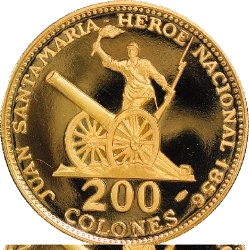
Every April 11, the entire country of Costa Rica has reason to think of Nashville: the national holiday of Juan Santamaría Day. (This year, the holiday's falling during Holy Week has pushed back the marching bands, parades, concerts, and dances to Monday, but the official day is today.)
Juan Santamaría Day stems from events on April 11, 1856, when the Nashville-born pirate/filibuster/mercenary William Walker was turned back from that Central American country due in part to the effort of a 19-year-old drummer named Juan Santamaría. Santamaría famously volunteered for a fatal mission to burn down the building from which Walker's men were fighting - a story told in greater detail here.
In 1856, the New York Times said Walker was "as widely known as that of any other living man in the Old World or in the New." Now, however, Walker is all but forgotten in his native city, except for one historical marker.
Santamaría, on the other hand, is a Costa Rican national hero. He is remembered in the Juan Santamaría Historical and Cultural Museum dedicated to the military campaign leading up to Walker's ouster, various parks and statues, the main airport in San José, Costa Rica - Juan Santamaría International, and by national holiday, Juan Santamaría Day, April 11. Costa Rican folklore prominently features Santamaría - in 2006, the BBC reported a Costa Rican girl's off-the-cuff biography of Santamaria: "He's the drummer boy who expelled the filibusters."
Walker's story is not completely forgotten in the U.S., having been featured in numerous American books - most recently, in the 2008 work Tycoon's War: How Cornelius Vanderbilt Invaded a Country to Overthrow America's Most Famous Military Adventurer. Walker memorabilia was featured in a Nashville estate auction covered by the local press in 2008. Nashville historian Bill Carey published a piece on Walker in the Vanderbilt Register in 2002. Walker was even the subject of a major motion picture in 1987 - the oddball movie Walker, starring Ed Harris and featuring Peter Boyle as Cornelius Vanderbilt.
But it's no wonder Walker isn't more widely known in Nashville. As the New York Times put it in 1860:
If he be a brigand, and an enemy of the human race, as most civilized people now consider him, he has merited the gallows a dozen times over for divers[e] robberies, murders and piracies; and if he be a hero and philanthropist, he ought to be hanged for making so many attempts, causing so much bloodshed and never succeeding.Two prominent Nashvillians who grew up in Costa Rica are Giancarlo Guerrero, conductor of the Nashville Symphony, and Renata Soto, Executive Director of Conexion Americas. Should Nashville schoolchildren learn at least as much about Walker as Guerrero and Soto likely did? Walker certainly won't get a national holiday in the U.S. - but I find it strange that native Nashvillians like me don't know more about him.

No comments:
Post a Comment